These Stuffed Cornish Game Hens are filled with a flavorful wild rice stuffing and slathered in a triple-herb butter that’s sure to impress! Serving these cornish hens will make you look like a professional chef with each guest getting their own individual chicken. I share all of my tried-and-true recipe tips with you so you can make perfectly golden brown roasted cornish hens for your next dinner party or holiday gathering.
Whether you’re looking for an alternative to your regular Thanksgiving menu or are in search of a great dinner party menu, this roasted cornish hen recipe will absolutely deliver.
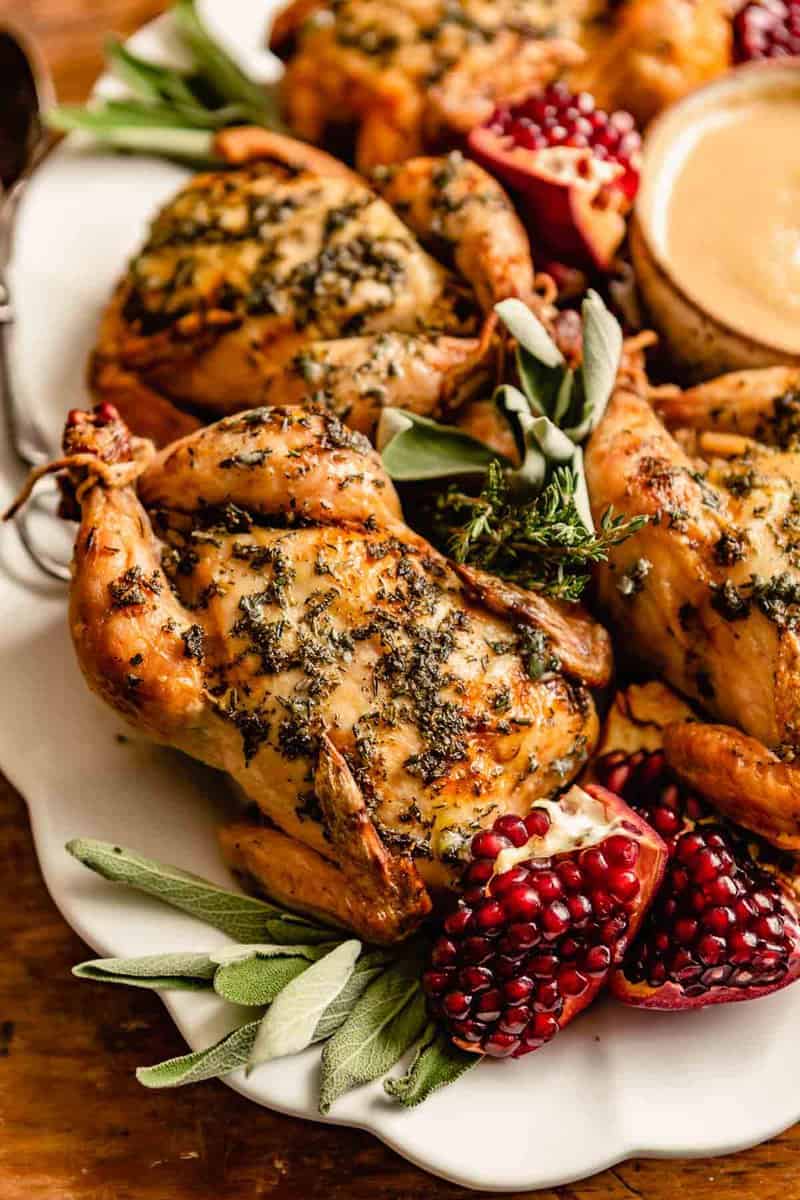
I tested this recipe out several different ways using my roast chicken and turkey methods to make sure these smaller hens were prepared perfectly every time. I found that a few simple steps like brining, flipping the birds while roasting, roasting at two different temperature and slathering with an herb butter, results in the most juicy and tender chicken meat you can imagine.
To ensure each cornish hen is essentially a meal-all-in-one, we like to stuff the small chickens with a simple yet delicious wild rice stuffing. It’s savory and herby with pops of sweetness from dried cranberries. Pour a glass of wine and dinner is done!
One other thing to note: each step of this recipe takes a bit of time (brining and roasting). But keep in mind these minutes are largely hands-off.
To cut down on cook time the day-of, prepare the stuffing up to 2 days in advance and store in the refrigerator.
Why this Recipe Works
- Impress your guests. A roasted cornish hen recipe is always gets a “Wow!” from guests since everyone gets their own small chicken.
- Quicker cooking time than a chicken or turkey. These hens take just over an hour to roast and are easier to manage in your oven than a large bird.
- Mostly hands-off cooking. This recipe has very simple preparation steps that only take about 15 minutes. Great for hosting a large crowd.
- Easy to customize. Use your favorite stuffing recipe or herb butter to make it your own.
What is a Cornish Game Hen?
Cornish hens, also called cornish game hens or rock cornish game hens, are a breed of chicken. According to the USDA, they are young immature chickens that are around 5 to 6 weeks in age, so basically small chickens.
On average, a cornish hen weighs between 1 and 2 pounds.
Because of the meat to bone ratio, a single hen is generally just enough for one serving, which is partially the beauty of them—each person gets some light meat, dark meat, and a bit of that delicious skin.
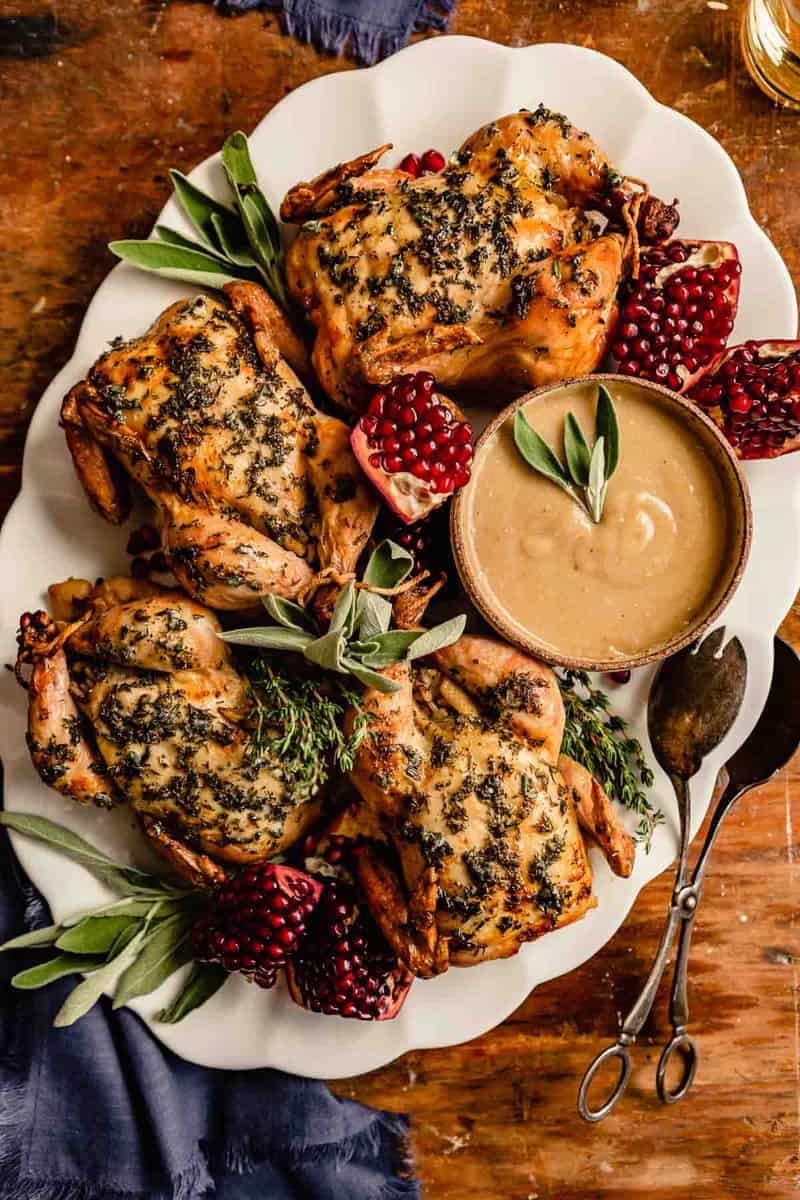
Ingredients
There are two parts to this roasted cornish hen recipe, the first is the brining and compound butter of the cornish hen for roasting. The second is the wild rice stuffing.
For the Cornish Hens:
- Kosher salt: I develop my recipes using Morton Kosher Salt. If you’re using Diamond Crystal, refer to What is Kosher Salt for a guide on making that converion.
- Cornish game hens: You can find cornish hens usually in packs of two in the freezer section. Aim for about 1 ½ pounds per hen. Allow the hens to thaw overnight in the refrigerator before using.
- Unsalted butter: I develop recipes with unsalted butter so I can control the seasoning. Though salted butter will work just fine here. You’ll need 5 tablespoons for the hens.
- Fresh sage: this recipe uses a trio of fresh herbs and sage is one of them! It’s one of my favorite flavors to cook with in the fall. You’ll need some for the cornish hens as well as the wild rice stuffing so grab a large bunch.
- Fresh thyme: you’ll need 1 tablespoon of fresh thyme leaves—so just grab one small bunch. Make sure you remove the leaves from the woody stems and discard the stems.
- Fresh rosemary: you just need a couple teaspoons of fresh rosemary so a small bunch will do. Use the rest of the rosemary as garnish or in our Chicken Pot Pie Soup.
- Whole wheat or all-purpose flour: either type of flour will work here—you’ll be using it to make a roux for a from-scratch gravy. And if you need the gravy to be gluten-free, I find sorghum flour does a great job thickening rouxs.
- Dry white wine: you’ll need a ¼ cup of dry white wine—something you’ll want to enjoy with the hens! I recommend something like a pinot grigio or sauvignon blanc. Alternatively, if you don’t want to open a bottle of wine, you can use extra-dry vermouth.
- Low-sodium chicken broth: you’ll need 2 ½ cups low-sodium chicken broth. So grab two cans or one box of broth.
For the Wild Rice Stuffing:
- Wild rice blend: I like to use a wild rice blend for the stuffing. It’s a combination of wild, white, brown and red rice.
- Unsalted butter: You’ll need a bit more unsalted butter for the stuffing! You’ll need 2 tablespoons for the stuffing. Olive oil can also be used.
- Shallots: You’ll need ½ cup chopped shallot, so grab one large shallot or two medium shallots. I wouldn’t recommend substituting with onions, though if you have to opt for a yellow onion.
- Carrot: you’ll need one small to medium carrot for this recipe.
- Celery: just one stalk is all you need for the rice stuffing. Use the rest of your celery to make a Celery Salad.
- Fresh sage: you’ll need a tablespoon of chopped fresh sage. I recommend prepping all of the sage for the recipe (the hens and the stuffing at once) and just measure out what you need as you cook.
- Dried tart cherries: these add so much flavor to the stuffing! Small pops of sweet-tart flavor to balance out all the savoriness. Dried cranberries can also be used.
- Fresh parsley: just 2 tablespoons is all you need—but that small amount really brightens up the stuffing. Use the rest of the parsley as garnish or greens in a Butter Lettuce Salad.
- Red wine vinegar: a splash of vinegar adds some much needed acid to the savory stuffing. You can also use apple cider vinegar or white wine vinegar. Do not use balsamic.
How to Make Stuffed Cornish Game Hens
- Brine
- Make the Herbed Butter
- Make the Stuffing
- Prep the Pan
- Stuff the Hens
- Roast the Hens
- Increase the oven Temperature
- Make the Gravy
Brine the hens for 2 hours (optional, but recommended). Rinse, then thoroughly pat dry with paper towels.
Mix together the softened butter, herbs, salt and pepper.
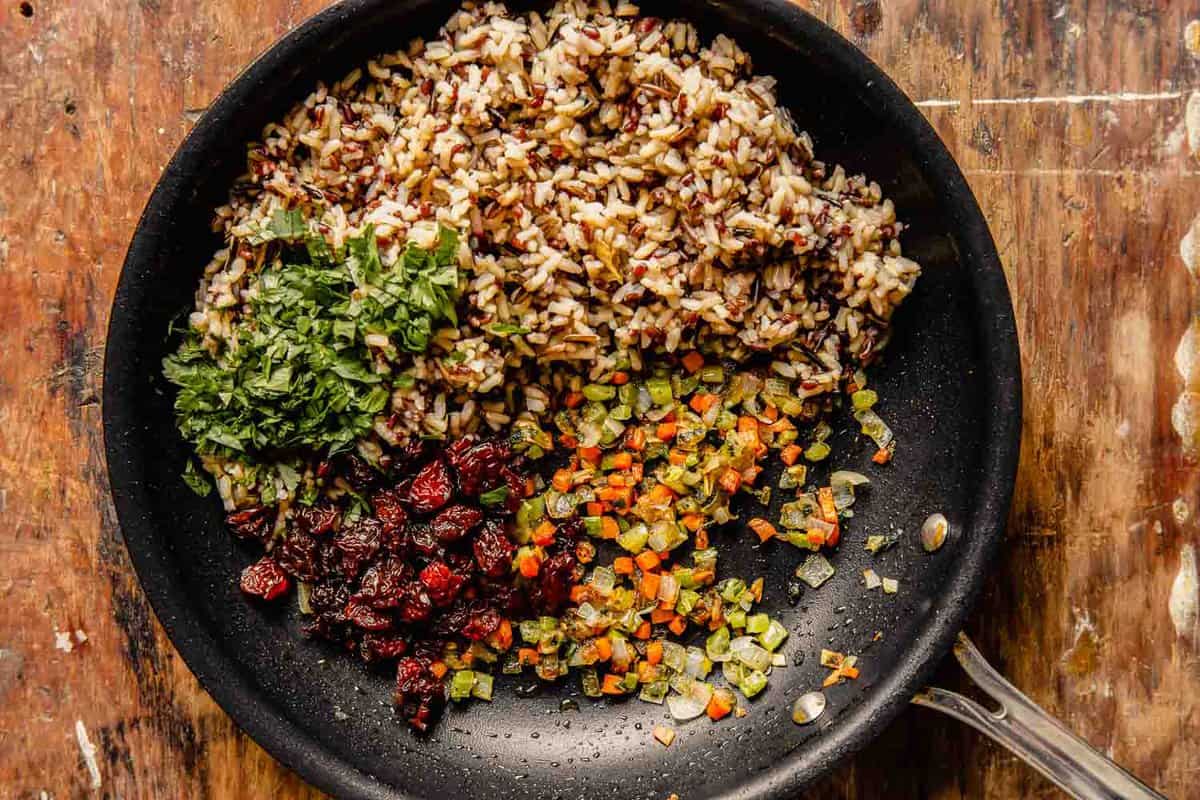
Prepare the stuffing and keep warm (or reheat) before stuffing the hens.
For food safety reasons, it’s important that the stuffing is hot when spooned into the hens.
Place a wire rack on a rimmed baking sheet and preheat your oven.
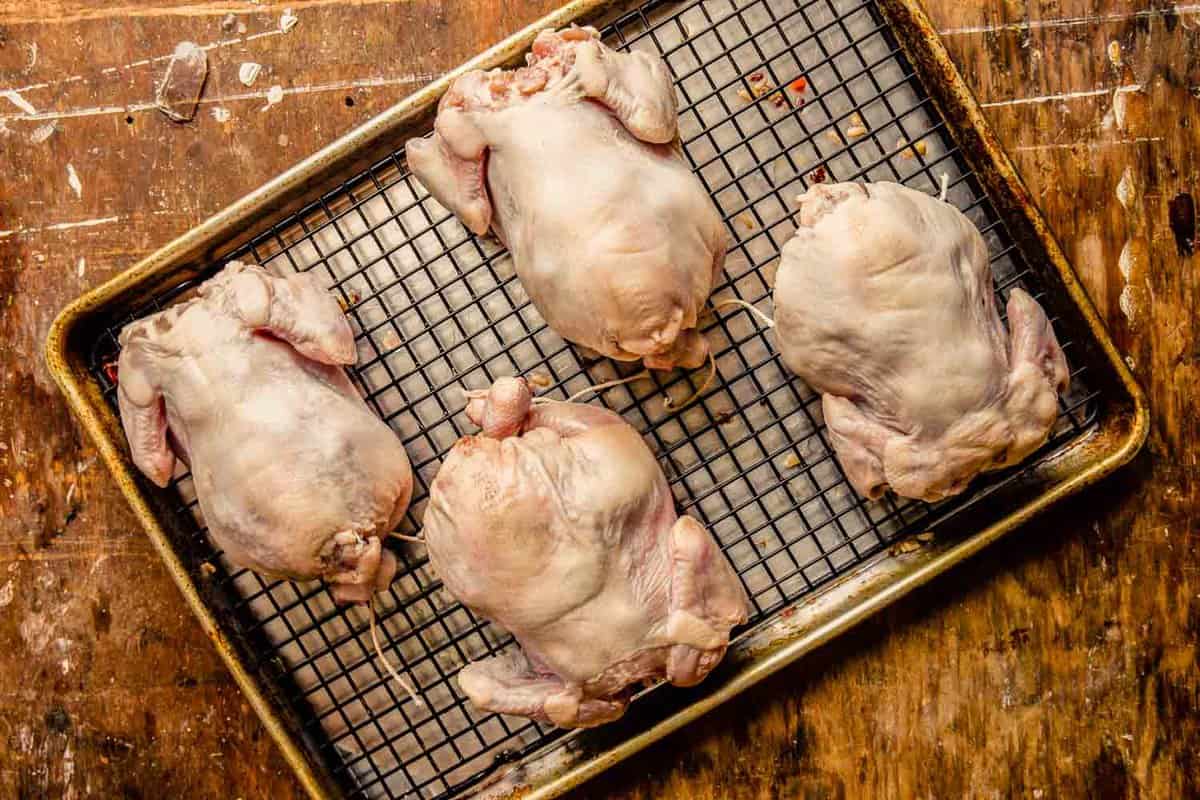
Stuff the hens with the warm wild rice stuffing and tie the legs together with kitchen twine. Place the hens, breast side down, on wire rack-lined baking sheet.
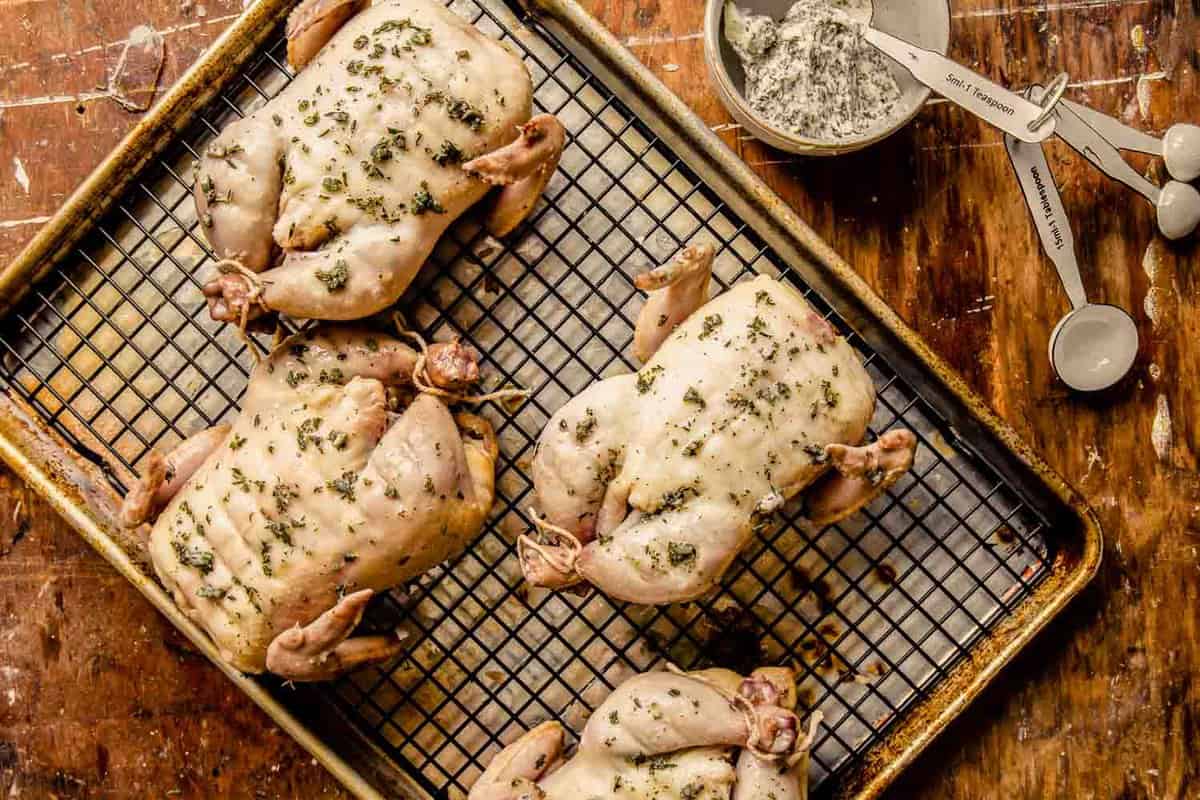
Roast the hens until the backs start to turn golden brown, about 25 minutes. Spread some herb butter over the backs, then flip the hens, breast side up, and spread herb butter over breast and legs. Continue to roast the hens until the stuffed cavity registers 150ºF (65ºC). This will take about 25 minutes.
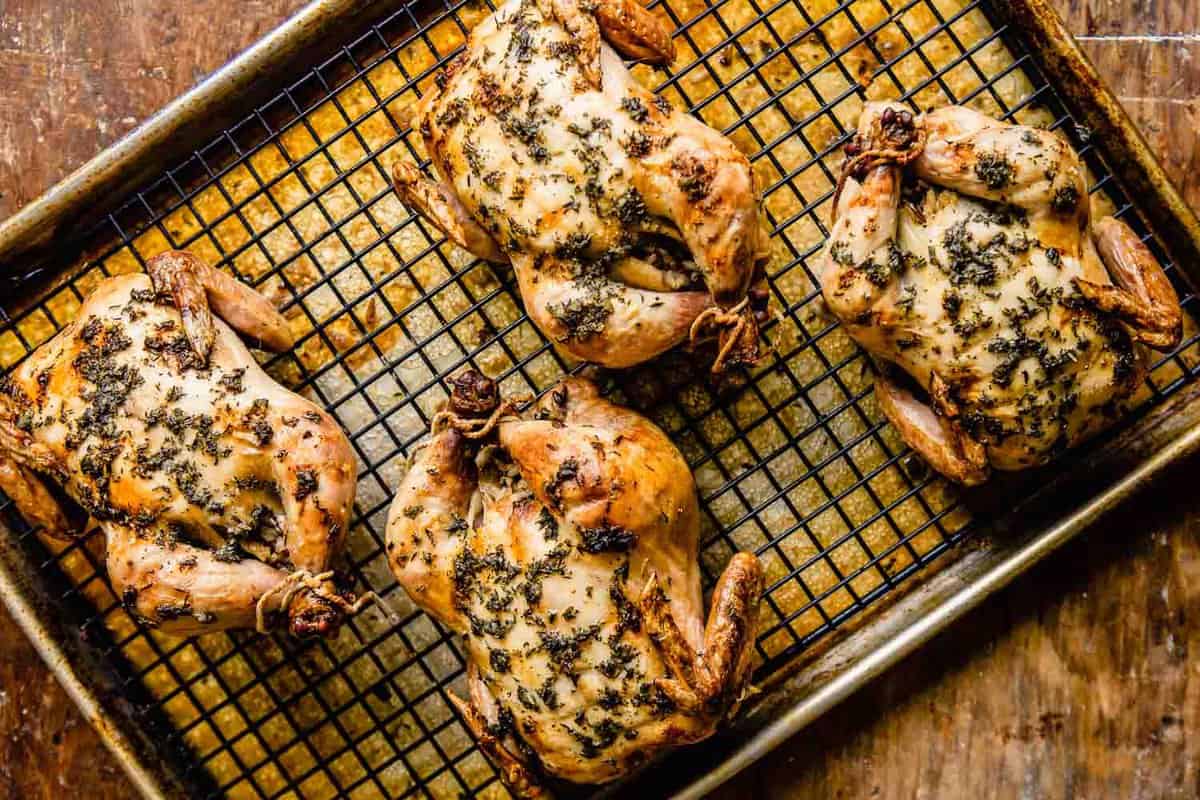
Brush the breasts and legs with more herbed butter, increase the oven temperature to 450ºF (232ºC)—this helps with browning—and continue to roast until the stuffed cavity register 160ºF (71ºC). This last part of cooking will take about 15 minutes.
While the hens rest, make the gravy with the pan drippings.
Carving a Cornish Game Hen
We like to serve one whole hen per person, especially if the hens are around 1 ½ pounds. If you’re cooking slightly larger hens (2 pounds), you can cut the roasted hens in half and serve a half per person.
In this case, we recommend doubling the wild rice stuffing and serving the extra on the side.
To cut the roasted hens in half, slice between the breasts with a sharp Chefs knife or cleaver, then use some force to cut through the bone. If needed, use sharp kitchen shears to cut the bone.
Serve cornish hens with the pan-drippings gravy, or make a jus (see recipe notes for instructions).
Garnish with a few sprigs of fresh rosemary, thyme sprigs and/or bunched of sage. We also like to dress it up with a winter fruit such as pomegranate or citrus.
Expert Tips
- Brining the hens makes them golden and moist. A wet brine overnight is ideal for these chickens. This makes the meat tender and the skin crispy and golden after roasting.
- Two-step roasting process. For the best, most juicy roasted cornish game hens, we recommend starting them at a moderately high temperature before increasing the heat towards the end of cooking.
- Roast using a wire rack set inside a rimmed baking sheet. This allows for air circulation around the hens while roasting for even cooking and browning.
- Start the roasting process breast-side down. The drippings run down the hen into the breast which keep the lean meat juicy.
- Cook by temperature. The breasts should register 160ºF and the thighs 170ºF on a meat thermometer.
- Be sure it’s a wild rice blend. Look for a dry rice blend mix of red, black, brown and wild rice.
- When buying, look for hens in similar weight. They are often in the freezer section of the grocery store.
- Follow food safety guidelines for stuffing poultry. It’s important that the stuffing is hot when spooned into the raw hens.
Variations
There are several variations for this roasted small chicken recipe and here are some of our suggestions.
- With the herb butter, try using your favorite fresh or dried herbs or spices in the mixture. You can also add some citrus zest, like lemon or orange for a nice twist.
- Use a dry brine instead of wet. If you don’t want to wet bring your hens, you can dry bring overnight by just heavily sprinkling the outside of the hens with salt, placing them on a wire rack fitted inside a rimmed baking sheet, and leaving them uncovered in the fridge overnight. When ready to roast, just pat dry, no need to reseason.
- Swap out the wild rice stuffing. Feel free to get creative here. You can make a regular bread stuffing, cornbread stuffing, or just go the simple route and stuff the hens with fresh herbs and lemon wedges.
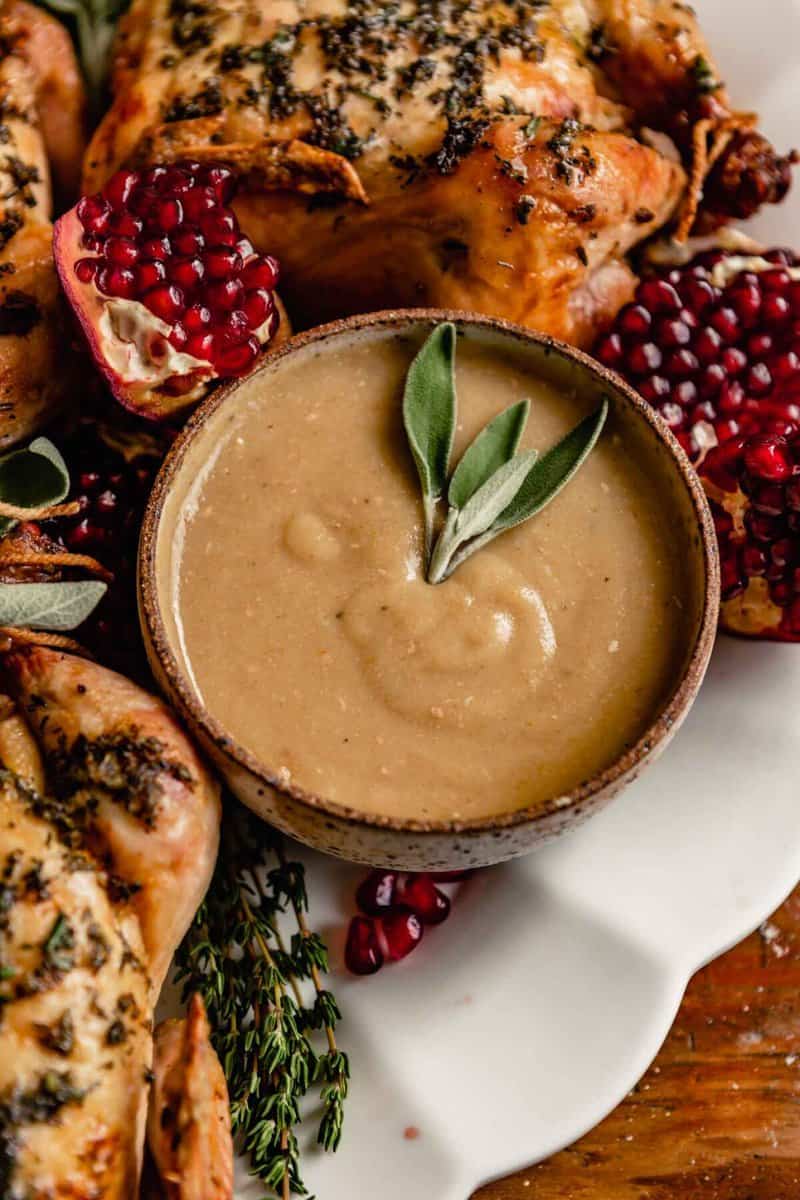
What to Serve with Roasted Cornish Hens
Vegetable Side Dishes
We’ve got loads of vegetable side dishes. Some of our favorites include our Roasted Beets & Carrots and Roasted Delicata Squash (sweet and salty—so good!).
Mashed Potatoes
If you’re looking for a mashed potato recipe, we’ve got some of those too! We also love a parnship mash for something a little different. And to mix up the menu even more, try our spectacular Sweet Potato Casserole.
Salad Recipes
And because we’re big salad lovers over here, we think every Thanksgiving spread needs a salad (or two!).
Some of our favorite salad recipes to serve with cornish hens include our uber-simple Fennel Salad, a modern and light Creamy Cucumber Salad, and of course our Apple Walnut Salad that’s to die for.
Dinner Rolls & Bread
Finally, we need to talk about dinner rolls and bread! We always love a batch of Japanese Milk Bread Rolls, but we also think there’s a time and place for our low-carb Nut & Seed Bread.
Make these deli-style Kaiser Rolls to serve with the meal (then use as sandwich buns later). Or try this sweet potato version of classic dinner rolls.
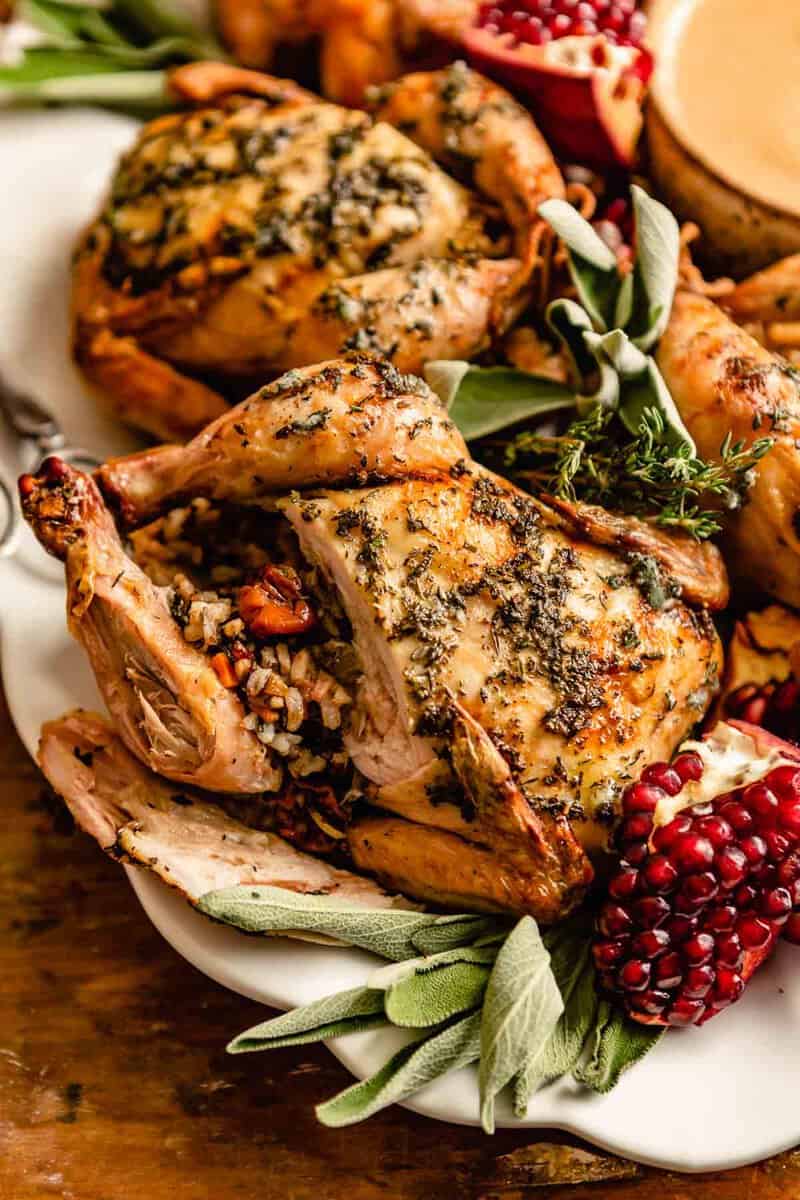
Storage
If you happen to have leftover stuffed cornish hens, then it’s best to store them in an airtight container in the fridge for up to four days. We also recommend removing meat from the bone before storing just like you would a chicken or turkey.
Keep the hen carcasses to make a delicious stock, they can be placed in a bag in the freezer for up to two months.
The best method for reheating is to place them in a skillet over medium-low heat with a splash of broth and/or butter. Partially cover with a lid and cook until just warmed through.
Alternatively, you can microwave the leftovers. Place them on a plate and heat in the microwave for 1 minute. Test the temperature, then continue to reheat in 30-second increments until warmed through.
FAQs
Cornish hens, also called Rock Cornish Hens, are breed of chicken petit in size and young in age. Cornish hens are generally about 4 weeks old and weigh right around 1 ¼ pounds (though they can weigh up to 2 pounds). They look and taste like chicken, but are far smaller and richer in flavor.
The best temperature to cook cornish hens at is between 400ºF and 450ºF. In this recipe, we like to start the small chickens at 400ºF and finish them at 450ºF to achieve a nice brown and crisp skin.
We like to stuff cornish hens with our Wild Rice Stuffing Recipe but you can also stuff them with aromatics, herbs (like rosemary and thyme) and citrus to impart even more flavor.
The key to making really great tasting gravy is to use the drippings from the roasted cornish hens. Pour the drippings from the sheet pan into a liquid measuring cup and let the fat separate from the liquid. Measure out a few tablespoons for making the gravy, then skim off and discard the remaining fat. Use the remaining drippings in the gravy.
Cornish hens taste like chicken with a bit more richness. They have a lower meat-to-bone ratio which means each piece of meat is a bit juicier and more savory.
Cornish game hens are not what they sounds like. They are not a hen (they can be male or female), they are not a game bird, and they are only partially a cornish chicken. Cornish hens are a cross-breed of cornish chickens (a large broiler chicken) and White Plymouth Rock hen or Malayn Fighting Cock. The result is a very small chicken that grows breasts quickly and are ready to be slaughtered in under 5 weeks. According to the USDA, in order for a chicken to be a cornish hen it must weigh between 1 and 2 pounds, must not be older than 5 weeks in age and can be either female or male.
Cornish hens are a cross-breed of cornish chickens (a large broiler chicken) and White Plymouth Rock hen or Malayn Fighting Cock. The bottom line: cornish hens are just small chickens.
Cornish hens are neither healthier or less healthy than regular chicken. If you’re looking for healthy chicken recipes, check out this list of 40+ Healthy Chicken Recipes.
Fresh cornish hens should be cooked or frozen within 1 day of purchasing. If you purchased frozen, they can be stored in the freezer for up to 3 months.
Thawed, previously frozen cornish hens should be cooked within 1 day of purchasing.
Cooked hens can be stored in the refrigerator for up to 3 days or frozen for up to 1 month.
Roasted Cornish Hens (Wild Rice Stuffing)
Description
Ingredients
Cornish Hens
- ¾ cup Morton kosher salt, or ½ cup table salt
- 4 Cornish game hens, each about 1 ½ pounds if possible, trimmed of extra fat, giblets removed
- 5 tablespoons unsalted butter, room temperature
- 1 tablespoon chopped fresh sage
- 1 tablespoon chopped fresh thyme
- 2 teaspoons chopped fresh rosemary
- Cracked black pepper
- 3 tablespoons whole-wheat flour (white or regular) or all-purpose flour
- ¼ cup dry white wine
- 2 ½ cups low-sodium chicken broth
Wild Rice Stuffing
- ¾ cups wild rice blend*
- 2 tablespoons unsalted butter
- ½ cup chopped shallots
- ¼ cup minced carrot
- ¼ cup minced celery
- 1 tablespoon chopped fresh sage
- ¼ cup dried tart cherries
- 2 tablespoons chopped parsley
- 1 tablespoon red wine vinegar
Instructions
Cornish Hens
- For the hens, dissolve salt in 3 quarts cold water in a large pot or bucket. Add hens, cover and refrigerate 2–3 hours. Remove hens, rinse thoroughly, and pat dry; prick skin all over breast and legs with point of a paring knife.
- Mash together 5 tablespoons butter, 1 tablespoon sage, thyme, rosemary, ½ teaspoon salt and ¼ teaspoon pepper in a small bowl; set aside.
Wild Rice Stuffing
- Meanwhile, for the stuffing, bring water to a boil in a medium saucepan. Stir in rice, bring to a boil, then reduce heat to low, cover and simmer until rice is cooked and fluffy, about 40 minutes.
- Heat 2 tablespoons butter in a medium sauté pan over medium-high. Add shallots, carrot, and celery; season with ¼ teaspoon salt and a pinch pepper; cook until vegetables are softened and starting to brown, 6–8 minutes. Stir in sage and cook 1 minute.
- Add cooked rice, cherries, parsley and vinegar, reduce heat to low and cook until warmed through. Remove from heat and set aside (or refrigerate) until ready to stuff hens.
Cornish Hens
- For the hens, adjust oven rack to middle position and heat oven to 400ºF (204ºC). Place a wire rack inside a large rimmed baking sheet (at least 19-by-13–inch). Reheat stuffing in a sauté pan until steaming.
- Spoon ½ cup hot stuffing into cavity of each hen; tie each hens legs together with 6-inch piece of kitchen twine. Leaving as much space as possible between each hen, arrange them breast side down and wings facing out, on prepared rack-lined baking sheet. Roast until backs are golden brown, about 25 minutes.
- Remove sheet from oven, spread 1 teaspoon herb butter over back of each hen. Turn hens breast side up and wings facing out, and spread 2 teaspoons herb butter over breast and leg area of each hen. Return pan to oven, add 1 cup water to sheet pan, and roast until an instant-read thermometer inserted into the stuffed cavity registers about 150ºF (65ºC), about 20–30 minutes.
- Remove pan from oven again and spread 1 teaspoon herb butter over breast and leg area of each hen. Return sheet to oven, add another ½ cup water to sheet and increase oven temperature to 450ºF (232ºC).
- Roast until hens are spotty brown and cavity registers 160ºF (71ºC), 15–20 minutes more, depending on hen size. (You can also check thickest parts of breast, which should register 165ºF, and thickest part of thigh, which should register 170ºF). Remove hens from oven, spread remaining butter over each hen and rest 10 minutes.
Gravy
- Meanwhile, pour drippings into a liquid measuring cup. Skim 3 tablespoons fat off top and add to a small saucepan over medium heat. Skim and discard remaining fat from drippings.
- Add flour to saucepan with fat and cook 2 minutes, whisking constantly. Slowly add remaining drippings, wine, and broth and bring to a boil. Reduce heat to medium and cook until thickened, 5–8 minutes. Strain gravy through a fine mesh strainer into a serving dish or gravy boat.
- Serve cornish hens with gravy.
Equipment
Video
Notes
Nutrition
Thanksgiving Recipes To Try
Helpful Cooking Guides
Cooking Tips & Techniques
How to Blanch Green Beans
Cooking Tips & Techniques
Flaky Food Processor Pie Crust
Cooking Tips & Techniques
How to Make Homemade Whipped Cream
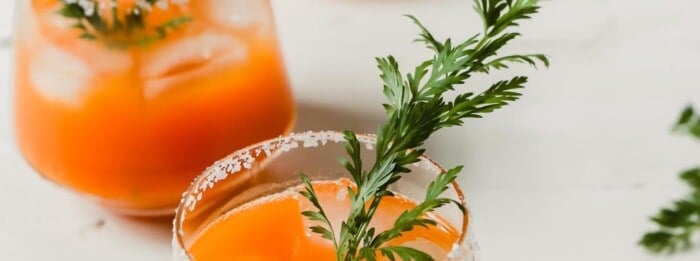
This recipe article was originally published on November 11, 2020.
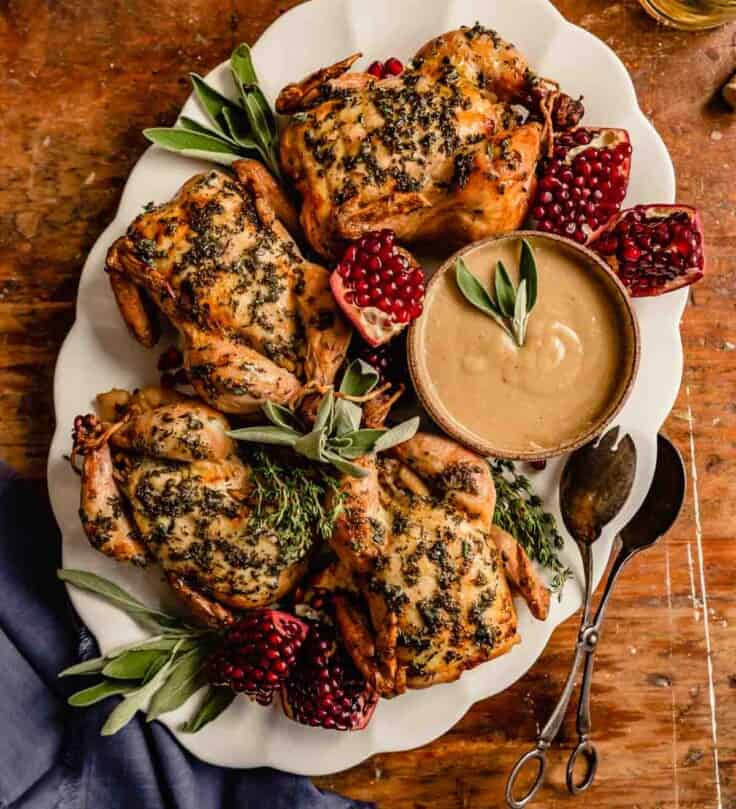
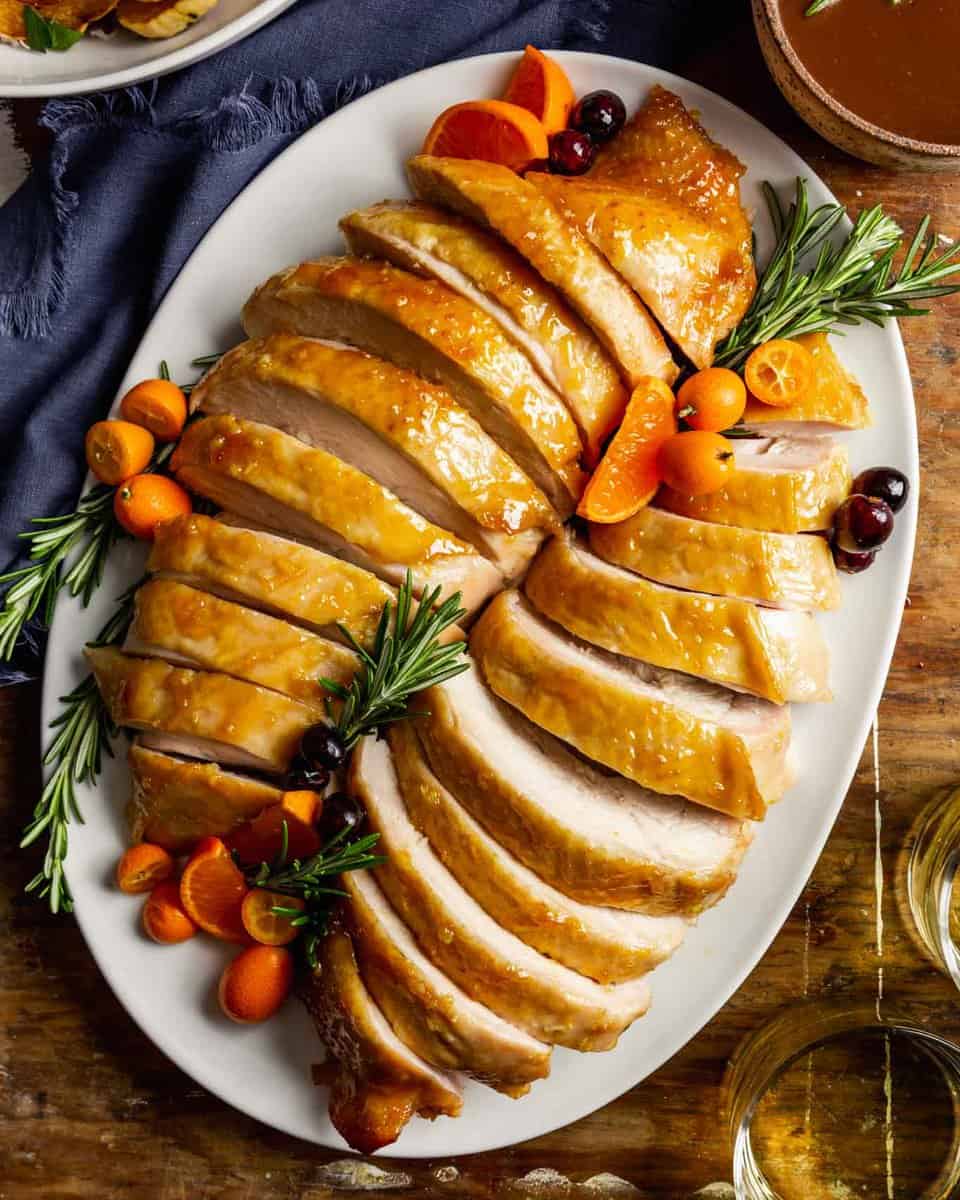
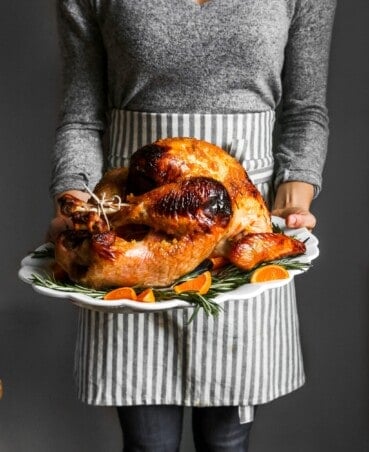
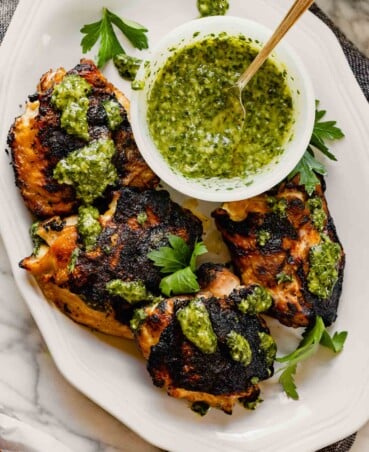
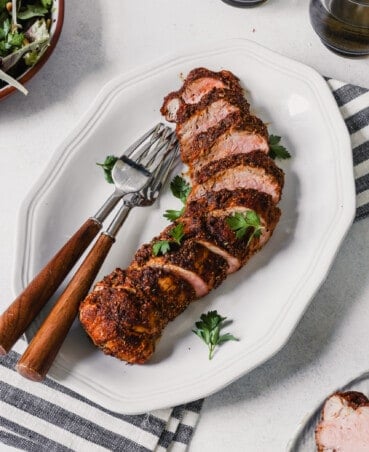
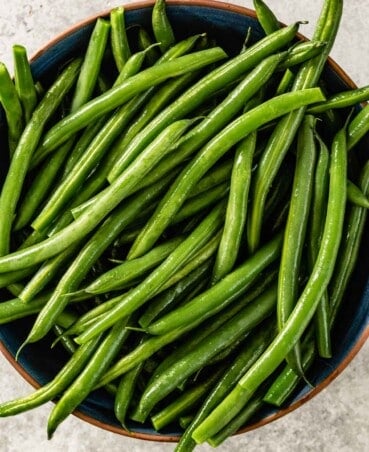
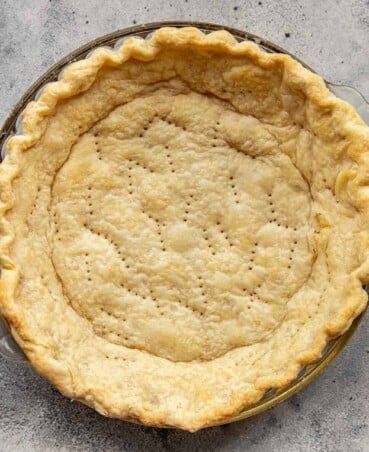
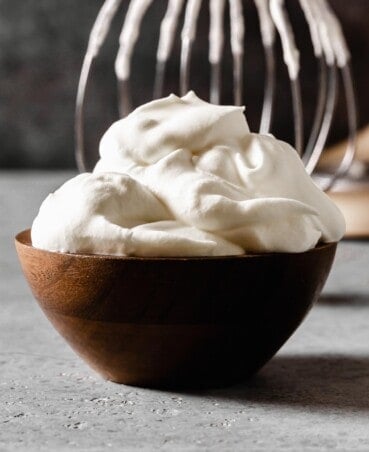
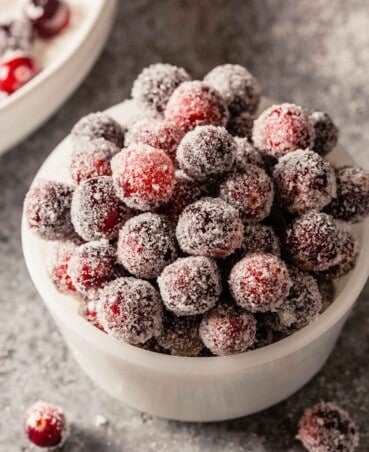
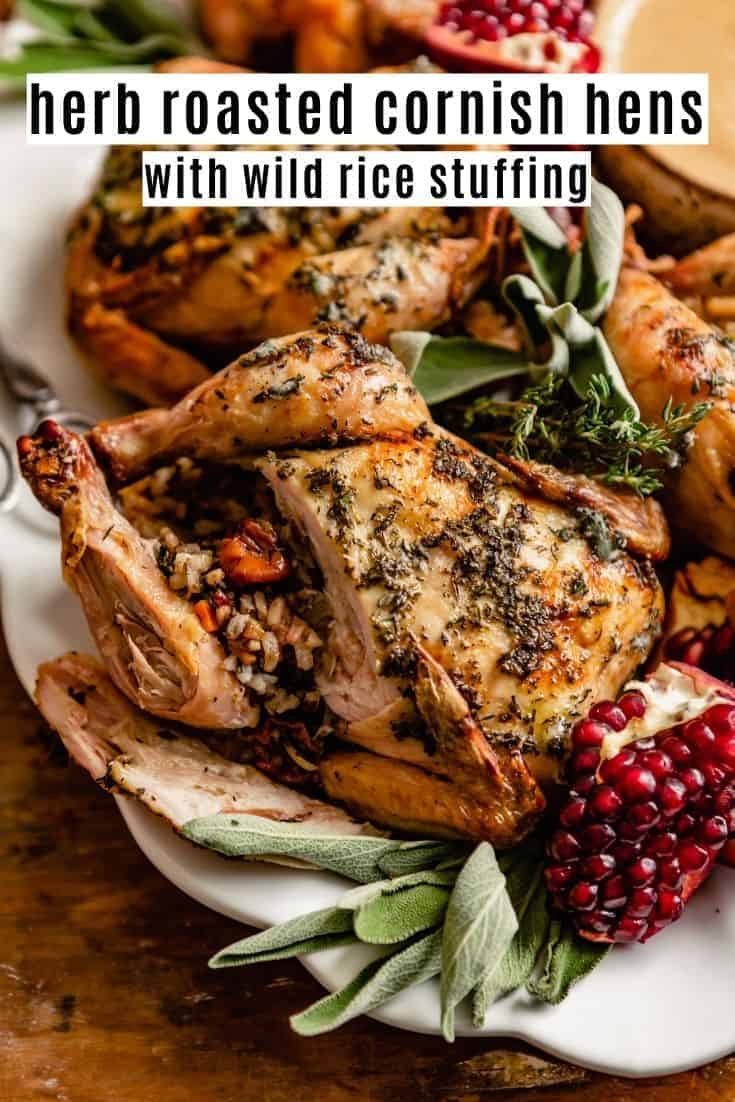
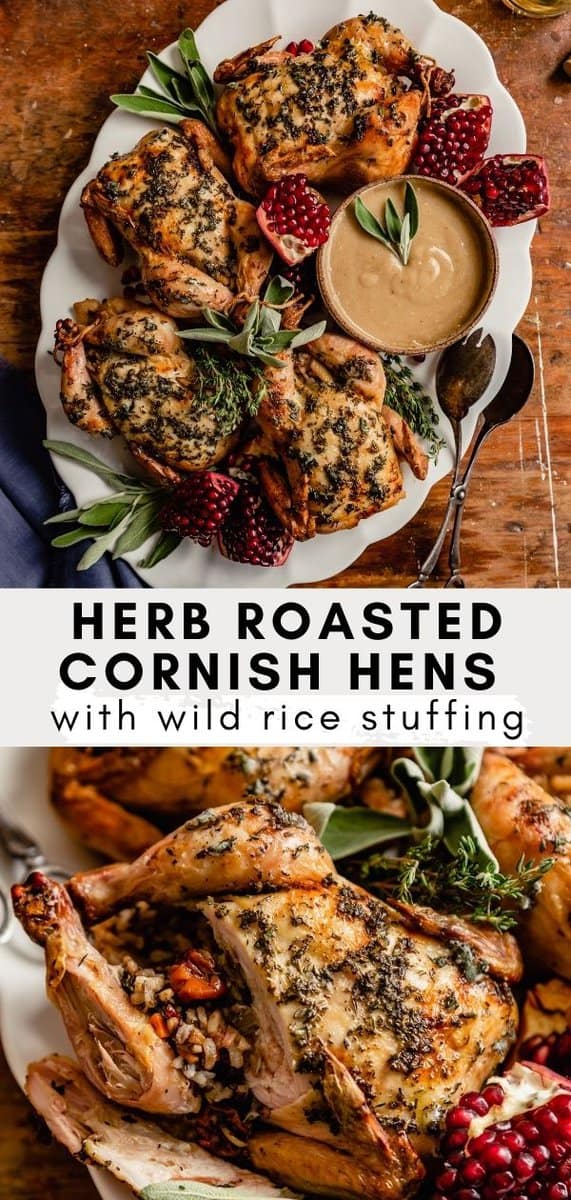
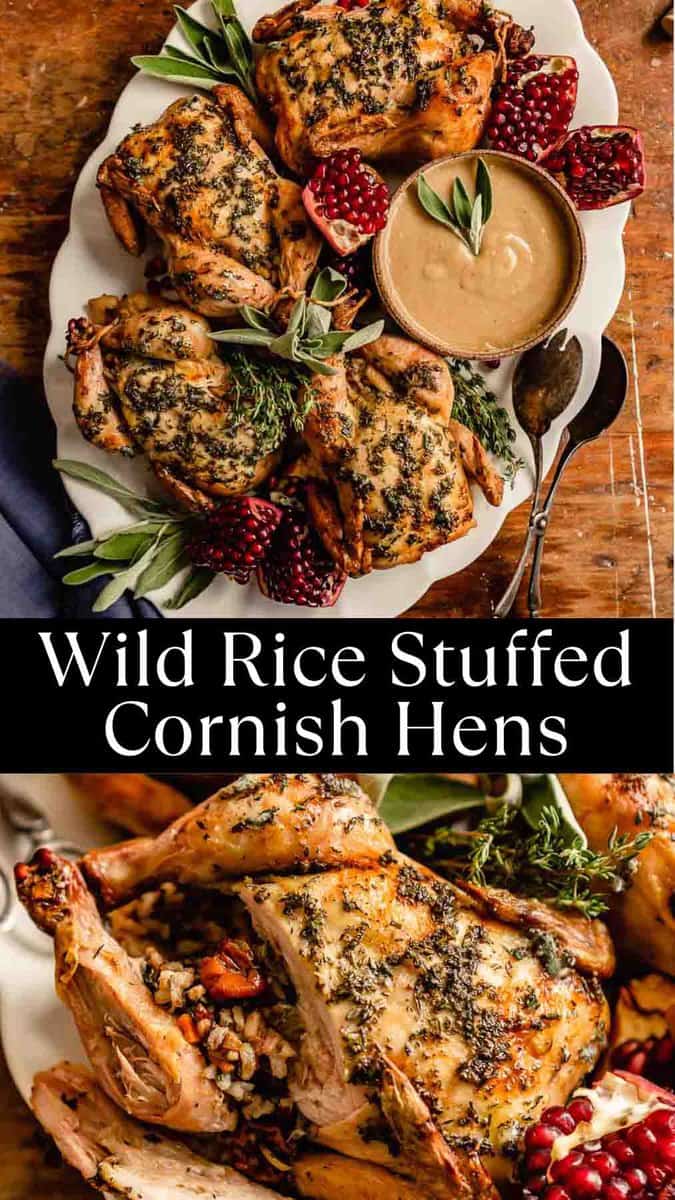
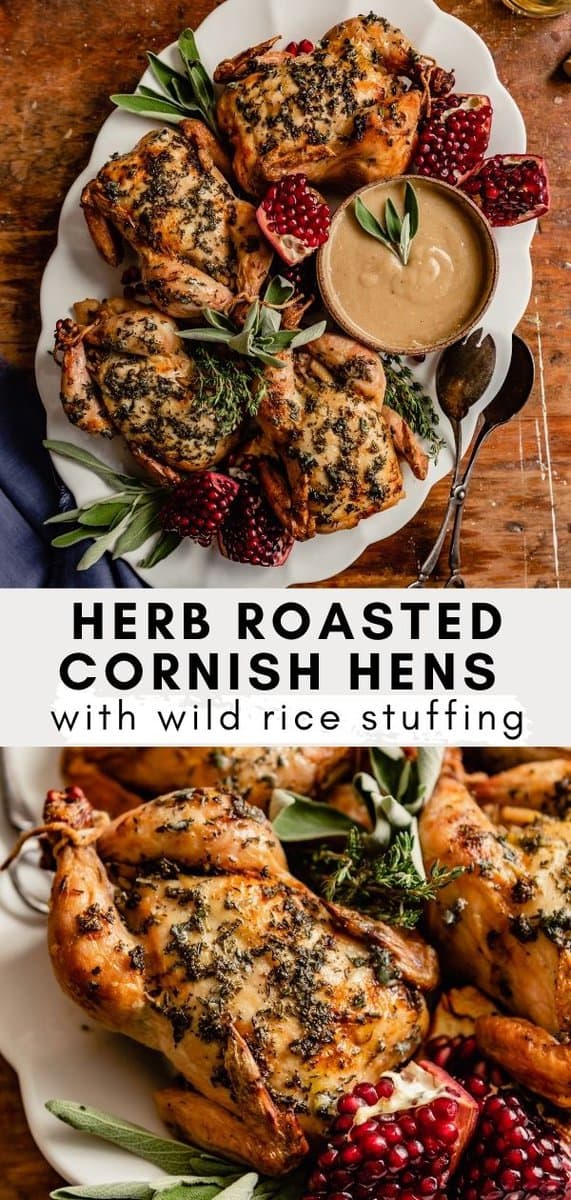
Wow! Can I give this recipe 10 stars! I made this last night for a couple friends and we were blown away. So flavorful and elegant. I am saving this recipe and will be making it for a smaller Thanksgiving gathering this year. Cheers!
Amazing recipe!! Served this for our friends wine night and everyone was so impressed. Thank you for making me look good.
Scrumptious recipe. Very clear directions and killer gravy.
This sounds amazing and I’d like to make it for a dinner party of 9. Do you think I could roast them ahead and then delicately reheat? Any tips?
Oooh great question! I think you could definitely do that. I would reheat them on a wire rack set in a baking sheet (with a bit of water in the baking sheet) in a 300-degree oven until warmed through. The water will keep them moist. Just make sure when you initially cook them that the stuffing gets to 160ºF.
I would then store them in the refrigerator either still on the wire rack set in the baking sheet or on a large platter and wrapped in plastic wrap. I hope that helps! Let me know how it goes.
I did a trial run with 2 hens. First, it was DELICIOUS and I just sort of winged it, as it was not exact. My husband and I ate the first one after letting it rest. We put the second one in the fridge on a rack and covered with foil. The next night, I preheated the oven to 300 and then popped it in till warm. While they were certainly still delicious, they were a bit drier the second day. Not enough to toss out or not eat it, just not quite as succulent as right out of the oven. It makes sense, it’s such a small bird, its delicate. So, I will be problem solving that for this weekend’s progressive dinner party. Thanks for such a wonderful recipe! Excited to serve it.
They turned out amazing and everyone loved them! Delicious!
Hi Katmandu, I’m so happy to hear everyone enjoyed them! Thanks for letting me know!
I was super intimidated to try cooking cornish hens. I found your recipe and we loved how it came out. Everyone was so impressed!
I’ll be making this recipe for the first time for Thanksgiving this year and I’m pretty excited about it. Question: do the dried tart cherries need to be unsweetened, or does it matter? Most of the ones in grocery stores are sweetened. The unsweetened ones are harder to find locally, but if that’s what’s called for, I’ll order some from an online vendor if need be. I don’t want to risk ruining the recipe by using the wrong cherry! Please advise. Thanks in advance. 🙂
Hey RJ, great question! You can use the sweetened dried cherries at your grocery store. I find unsweetened cherries add a nice tartness, but the sweetened ones will work just fine. I can’t wait to hear what you think!
Can I brine them and make the stuff a day ahead of time so I only have to roast them the day of? I am thinking of making these for the first night of a weekend away with a group of friends and timing wise it would be best if I didn’t have to wait for them to bribe when I got there (also the travel time is longer than the brine time so I can’t have them brining while traveling)
Absolutely! Once they are done brining, rinse and pat them dry then arrange on a rack set inside a baking sheet or roasting pan (depending on how many you are making and how you’d like to transport them). For storage, I would refrigerate them uncovered—this will dry out the skin and encourage a crispy skin. Then cover for travel.
Lastly, be sure to reheat the stuffing mixture until steaming prior to stuffing the hens—this is important for food safety reasons.
Yum! What a fun dinner to serve friends!